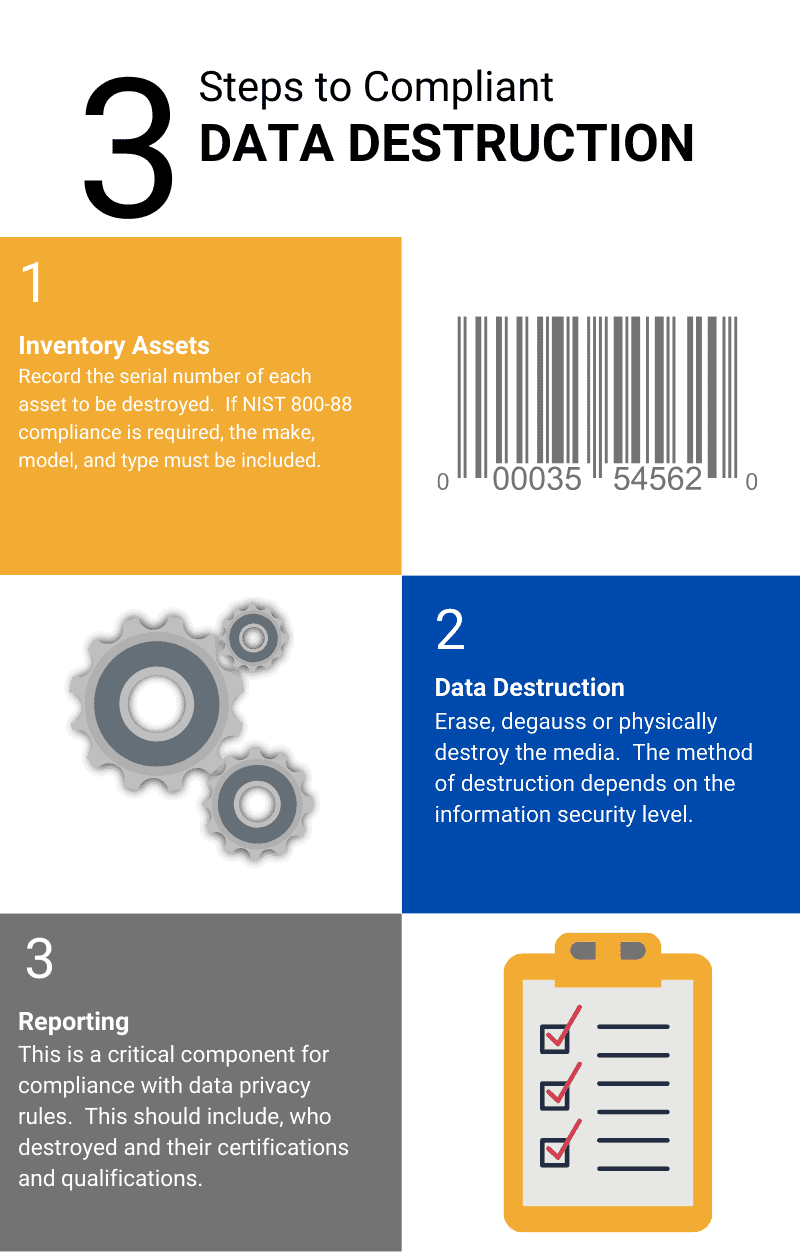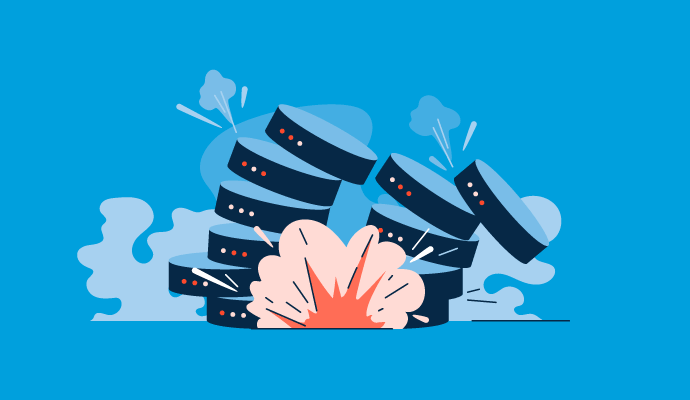Leading Tips for Ensuring Secure Data Destruction in Your Cyber Security Strategy
Leading Tips for Ensuring Secure Data Destruction in Your Cyber Security Strategy
Blog Article
The Importance of Effective Information Damage Practices in Safeguarding Sensitive Information and Ensuring Computer Safety
In an era where information violations are progressively typical, the value of reliable information destruction techniques can not be overemphasized. Organizations face substantial risks when delicate info is improperly dealt with, potentially causing unauthorized accessibility and serious monetary effects. Implementing robust information devastation methods not just minimizes these dangers however also straightens with lawful compliance needs, guaranteeing that organizations support their online reputation and foster client trust. The question stays: what certain methods can be used to boost these practices, and exactly how can companies properly integrate them right into their general cybersecurity structure?
Recognizing Information Destruction
Understanding data damage is vital in today's digital landscape, where sensitive details can conveniently be compromised. Effective information damage involves not simply removing data however ensuring that data is irretrievable through detailed techniques. This process is essential for companies that handle confidential customer information, intellectual residential property, or internal files, as any violation can lead to severe monetary and reputational effects.
Data destruction incorporates different strategies, consisting of shredding physical media, degaussing magnetic storage tools, and using software-based services that overwrite information numerous times. Each technique offers a specific function and must straighten with the sensitivity of the details being gotten rid of. For instance, physical devastation is often liked for hard disks having very private data, while software techniques could suffice for less delicate info.
Additionally, sticking to sector standards and regulations, such as the General Data Security Policy (GDPR) or the Health Insurance Policy Portability and Responsibility Act (HIPAA), is necessary for conformity and to minimize lawful risks. Organizations must establish a robust information destruction policy, train staff members on best methods, and regularly investigate their procedures to ensure that all sensitive details is gotten rid of safely and efficiently.
Dangers of Inadequate Practices
Poor data devastation methods subject companies to significant risks that can have far-reaching repercussions. When delicate info is not appropriately disposed of, it remains susceptible to unauthorized gain access to, which can lead to information violations and identity burglary. Such cases not only endanger the protection of individuals however likewise taint the company's online reputation, resulting in a loss of consumer trust and possible financial consequences.
In addition, regulative conformity is progressively strict in many industries. Failure to abide by information destruction policies can cause substantial fines and lawful actions against organizations. These charges can draw away and strain financial resources attention from core organization operations.
In enhancement, the misuse of recurring data can bring about intellectual residential property burglary or company espionage, jeopardizing affordable advantages (data destruction). The influence of poor data devastation prolongs beyond instant economic losses; it can likewise lead to lasting damages to brand stability and market position

Organizations need to acknowledge that data safety is not exclusively about avoiding breaches; it additionally encompasses the liable administration of data throughout its lifecycle. Overlooking reliable information devastation methods can have disastrous ramifications, highlighting the necessity for robust procedures to alleviate these dangers.
Finest Practices for Data Devastation
Executing effective data devastation practices is crucial for safeguarding sensitive info and keeping compliance with regulative criteria. Organizations should adopt a multi-faceted method to guarantee that data is irretrievable, consequently preventing unapproved gain access to and possible violations.
First, data must be categorized based upon level of sensitivity, permitting organizations to apply suitable destruction methods tailored to the level of threat. For electronic data, utilizing software-based data-wiping devices that follow market requirements can effectively overwrite existing information. Physical devastation methods, such as shredding or degaussing, are vital for gadgets that keep delicate information, making certain complete elimination.
Developing a clear data retention policy is important, detailing how much time various kinds of info must be preserved Learn More before devastation. Routine audits of data storage space systems are also required to determine out-of-date or unnecessary data requiring removal.
In addition, training staff members on the value of data devastation and the specific procedures to adhere to fosters a culture of protection within the organization. Preserving documentation of data devastation refines gives accountability and sustains conformity with inner policies and outside guidelines. By adhering to these best methods, companies can considerably mitigate the threats related to information direct exposure.
Legal and Conformity Considerations

Failure to abide with these laws can cause severe fines, including significant penalties and reputational damages. Organizations must carry out a robust information devastation plan that lines up with these legal structures and provides clear standards on the correct Extra resources methods of information disposal, whether physical shredding or digital wiping.
Additionally, preserving documents of data devastation tasks is vital for showing conformity during audits or assessments. By focusing on legal and conformity considerations, organizations can enhance their information security pose and foster depend on with customers and stakeholders, ultimately adding to a more safe data monitoring setting.
Benefits of Effective Data Destruction
Effective information damage techniques expand beyond simple conformity; they offer considerable advantages to companies that prioritize them. By making sure that delicate information is irretrievably destroyed, organizations reduce the danger of information breaches and the potential economic repercussions connected with them. This proactive technique not only safeguards against unapproved gain access to however likewise boosts the total trustworthiness of the company in the eyes of stakeholders and customers.
Applying robust data damage techniques, such as physical devastation of storage space gadgets or advanced data wiping strategies, adds to the strengthening of an organization's cybersecurity pose. data destruction. It decreases the possibility of copyright theft and protects proprietary information, therefore keeping an one-upmanship in the market

Final Thought
In verdict, reliable data devastation techniques are vital for guarding sensitive info and improving total computer system safety. Eventually, a commitment to durable information destruction approaches promotes a culture of responsibility, thus enhancing an organization's cybersecurity position and preserving client count on.

Report this page